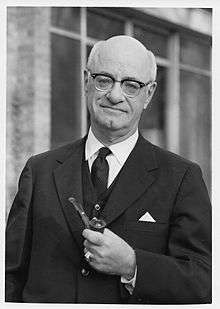Kenneth Setton
| Kenneth Meyer Setton | |
|---|---|
| Born |
June 17, 1914 New Bedford, Massachusetts, United States |
| Died |
February 18, 1995 (aged 80) Princeton, New Jersey, United States |
| Nationality | American |
| Occupation | historian |
| Known for | expert on the history of medieval Europe |
Kenneth Meyer Setton (New Bedford, Massachusetts, June 17, 1914 – Princeton, New Jersey, February 18, 1995) was an American historian and an expert on the history of medieval Europe, particularly the Crusades.
Early life, education and awards
Setton's childhood and adolescence were not easy. He supported himself from the age of 13. Setton received his bachelor's degree in 1936 as a Phi Beta Kappa graduate of Boston University.[1] He received his masters degree in 1938 and PhD in 1941 at Columbia University. His dissertation Christian Attitude Toward the Emperor in the Fourth Century was written under the direction of Lynn Thorndike. He also received honorary degrees from Boston University and the University of Kiel. He claimed that knowledge of languages is the basis of knowledge of historical science, and he spoke Italian, French, German and Catalan, besides his favorites, Latin and classical Greek.[2]
Kenneth Setton spent nearly two decades finishing his classic work, the four-volume The Papacy and the Levant, 1204-1571.[3] For the first two published volumes he received the Haskins Medal of the Medieval Academy of America in 1980.[4]
Setton received the John Frederick Lewis Prize of the Philosophical Society three times: first in 1957 for his work The Byzantine Background to the Italian Renaissance, then in 1984 for his work The Papacy and the Levant, volume 3 and 4 and in 1990 for his work Venice, Austria and the Turks in the 17th Century.[5]
Career

Setton began his teaching career at Boston University and the University of Manitoba. Then he taught at the University of Pennsylvania between 1950 and 1965, succeeding another medievalist, John L. La Monte.[6] In the period between 1965 and 1968 he taught at the University of Wisconsin, where he was appointed director of the Institute for Research in the Humanities. After 1968 he worked at the Institute for Advanced Study in Princeton, New Jersey.
He had many concurrent appointments, such as director of the library at the University of Pennsylvania, acting director of the Gennadius Library in Greece and Guggenheim Fellow.
Selected works
- Christian Attitudes Toward the Emperor in the Fourth Century, Columbia University Press, 1941, PhD dissertation
- The Bulgars in the Balkans and the occupation of Corinth in the seventh century, Mediaeval Academy of America, 1950
- The Papacy and the Levant, 1204-1571, four volumes, American Philosophical Society, 1976–1984, ISBN 978-0-87169-114-9
- Harry W. Hazard; Robert Lee Wolff; Marshall W. Baldwin; Norman P. Zacour (1955–1990), History of the Crusades, five volumes, University of Wisconsin Press, ISBN 978-0-299-04834-1, as editor in chief with Harry W. Hazard, Robert Lee Wolff, Marshall W. Baldwin and Norman P. Zacour as coauthors
- Venice, Austria and the Turks in the 17th Century, American Philosophical Society, 1991, ISBN 978-0-87169-192-7
- Western Hostility to Islam, American Philosophical Society, 1992, ISBN 978-0-87169-201-6
- Catalan Domination of Athens, 1311-1388
- Europe and the Levant in the Middle Ages and Renaissance
- Athens in the Middle Ages
References
- ↑ "Kenneth Meyer Setton". 141: 241. JSTOR 987307.
In 1936 he received a bachelorate from Boston University
- ↑ "Kenneth Meyer Setton". 141: 241. JSTOR 987307.
He believed that knowledge of languages formed basis of historical science, so he conversed easily in Italian, French, German and Catalan. His most enduring loves in this field, however were Latin and classical Greek.
- ↑ Saxon, Wolfgang (February 23, 1995). "Kenneth M. Setton, 80, Scholar And Author on Medieval Europe". The New York Times. Archived from the original on January 5, 2011. Retrieved January 5, 2011.
Dr. Setton spent nearly two decades finishing his four-volume "The Papacy and the Levant, 1204-1571" (American Philosophical Society, 1976-1984). A classic study of the era, it remains in print.
- ↑ "Haskins Medal Recent Recipients". Medieval Academy of America. Archived from the original on January 5, 2011. Retrieved January 5, 2011.
1980:Kenneth M. Setton, The Papacy and the Levant (1204-1571). 2 vols. Philadelphia: American Philosophical Society, 1976, 1978.
- ↑ "John Frederick Lewis Award". American Philosophical Society. Archived from the original on January 5, 2011. Retrieved January 5, 2011.
- ↑ "Awards for Scholarly Distinction" (cfm). American Historical Association. August 20, 2007. Retrieved January 5, 2011.
from 1950 to 1965 he taught at the University of Pennsylvania, where he succeeded another eminent medievalist, John L. La Monte.
External links
- Alamanac of University of Pennsylvania containing information about appointment of Kenneth Setton as professor of Medieval History
- Alamanac of University of Pennsylvania containing information about Setton being awarded with John Frederick Lewis Prize in 1957
- Short biography on Historians web site
- Short biography at Jstor website
- Obituary of Kenneth M. Setton published in New York Times